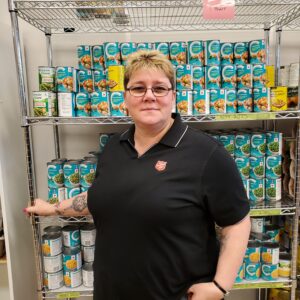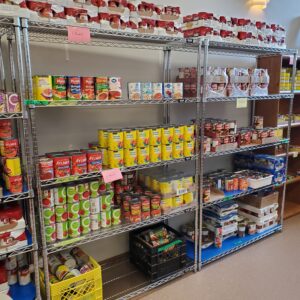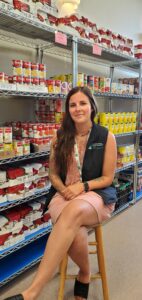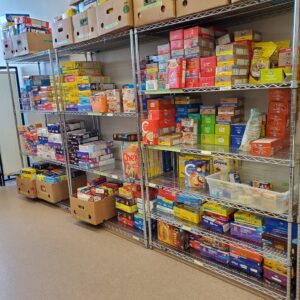Shopping with Points at the Kenora Food Bank

There’s a new experience waiting for people visiting the food bank at The Salvation Army in Kenora. The new grocery store model allows people to come in a shop for the foods they prefer, using a points system. Now clients have a say in the foods they receive.
 Sandra Poole is the community ministries director, overseeing Family Services and Thrift Stores in Kenora, Dryden and Sioux Lookout. She manages the food bank and the voucher program. Every client’s journey starts with her – she processes all the applications and deals with each client individually.
Sandra Poole is the community ministries director, overseeing Family Services and Thrift Stores in Kenora, Dryden and Sioux Lookout. She manages the food bank and the voucher program. Every client’s journey starts with her – she processes all the applications and deals with each client individually.
“The application process is very straightforward. Mostly done over the phone, but folks are also welcome to drop in and register in person if they prefer. All clients have to do is pick the phone up; the hardest part is reaching out,” Sandra explains. She asks for some basic information to figure out how best she can help; how many people are in the household and what kind of services they may need.
“Once they’re registered, we give them an appointment time. Then they come into the food bank. We let them shop to a certain extent. Any of the non-perishables are all done on a points basis. So, they have points assigned, and it’s entirely up to them what they use those points on,” says Sandra. The points system allows clients to select foods they prefer, in addition to basics which everyone receives including meat, dairy, fresh fruit and bread. The point system starts at 25 points per person, with five extra points for every additional household member.
 “Most things are one point or two. And it’s entirely up to them what they use it on in the food bank…” Sandra explains. “To encourage healthy eating habits, candies and treats have the highest value, at three points.”
“Most things are one point or two. And it’s entirely up to them what they use it on in the food bank…” Sandra explains. “To encourage healthy eating habits, candies and treats have the highest value, at three points.”
This new approach to the food bank was impossible until the Thrift Store moved out of the Family Services building in early 2021. The new food bank format launched in June of 2022, after setting up shop in the vacated space.
“In the first two weeks, we asked every client who came through the door what they thought of the new format, and the feedback was amazing. It gives them a choice. It also empowers them. And there’s a lot of dignity involved because they’re choosing their groceries for their family.” Sandra shared the story of a young mother who was delighted to be able to buy baking supplies. Access to those supplies creates a great bonding opportunity for her family.
 Hope Munn is a Mental Health and Justice Supportive Housing Case Manager. She schedules food bank appointments for clients whom she has helped find housing.
Hope Munn is a Mental Health and Justice Supportive Housing Case Manager. She schedules food bank appointments for clients whom she has helped find housing.
“They are individuals who have a hard time acquiring food other places with the income that they have. So, I bring them in and then they can pick what they want. It helps them because then they’re not having to spend their living expenses on food, because their living expenses are so small, most of it goes to rent. Not everybody knows that. It’s very expensive to live. So, this is very helpful in every way and gives so many options for them” she explains.
Hope says the one-on-one experience with Sandra walking each client through the process is a big help because many mental health clients have a difficult time in busy and crowded setting like grocery or big box stores.
“Lots of people don’t like to leave their house. When you have a mental health diagnosis, it’s sometimes visual to people, but sometimes it’s inside; you’re freaking out, you have anxiety,” Hope shares. “So, this really helps to have that one-on-one experience and not be overwhelmed by the number of people in a store. It gives them a little bit of like ownership. They have to come in and do it. It’s not just me picking up the hamper and bringing it to them. It gets them out of the house, and they get to have a shopping experience.”


